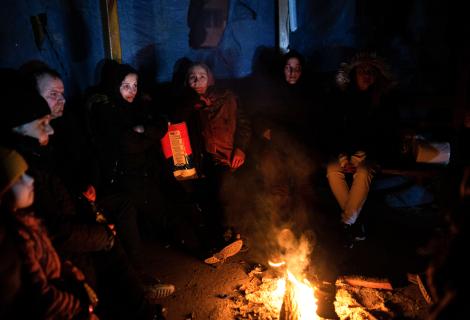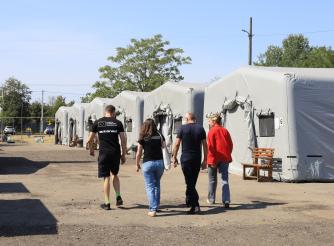Double tragedy for Syrian refugees with women and girls bearing the brunt of the earthquakes

ActionAid reports that the Turkey-Syria earthquakes have exacerbated the suffering of Syrian women who survived years of conflict, only to lose their temporary homes, neighbours and loved ones as well as their livelihoods.
Twelve years of war has already left women and children without fathers, brothers or husbands, and the number of widows or female-headed households as well as orphans has increased. Theirs is an increasingly uncertain future.
Sawser Talostan, local emergency responder working with ActionAid’s partner Violet said:
“The early morning of February 6 brought back terrible memories for Syrian refugees. Overwhelmed with flashbacks from the Syrian war, people started absorbing the tragedy the morning after. After a few hours, when they went back to their homes to grab some stuff, the strongest aftershock took place. In fact, it was a massive 7.5 earthquake which caused the remaining standing buildings to collapse, and so the tragedy aggravated.”
This is a hammer blow for Syrian people, displaced multiple times from their homes and struggling to cope. The north-west of Syria is home to 4.2 million people who live in temporary shelters including tents and fragile homes. Thousands of mothers and their children found themselves displaced again without anything amidst freezing temperatures.
Sawser Talostan, local emergency responder working with ActionAid’s partner Violet said.
“Children do not even know the meaning of the word home because they were born in, or live in a tent, and some of them do not even know the meaning of the word school."
Enduring a bleak economic crisis, families have been facing food insecurity, collapsing public services, soaring food prices, frequent power blackouts as well as a lack of access to clean water, resulting in an outbreak of cholera at the end of 2022, which is still ongoing.
Racha Nasreddine, Regional Director for ActionAid in the Arab Region said:
"We are concerned for the safety and wellbeing of women and their children already displaced by the Syrian conflict. Many women affected by the earthquake today are head of households, this disaster is adding to their suffering, and they require re-doubled support. There is an urgent need for food, water, blankets, shelter, and winter clothes. In a disaster like this, women and girls are highly vulnerable, more exposed and at risk of exploitation; their protection and safety is our top priority. We are providing protection services and safe spaces for women to shelter, breastfeed and wash their children and access the emotional support the need to cope with shock and trauma.’’
The earthquakes have devastated the lives of thousands who face unprecedented hardships in the coming weeks and months. ActionAid, through our local partners on the ground will remain with the families as we assess additional support needed including protection, psychosocial support, and menstrual health kits.
ActionAid is calling on the international community to ensure the humanitarian response to earthquakes is adequately funded, including care of survivors of gender -based violence and to support the safe and unhindered access of aid organisations to the hardest hit communities.
To contact the ActionAid Press Office media-enquiries@actionaid.org or call +44 7586107955.
Spokespeople available:
Racha Nasreddine is the Director for ActionAid in the Arab Region covering Syria, Lebanon, Jordan, and Tunisia. Previously, she led in the response to the Syrian crisis since 2015, neighbouring countries (Jordan, Iraq, Lebanon, Egypt) and within the diaspora. She has local and international experience working across multiple sectors and countries in Middle East and North Africa region on socioeconomic development, human rights, and cultural relations. Racha speaks Arabic and English- Currently in Jordan.
Razmi Farook is the Regional Director for Asia and Humanitarian at ActionAid. Razmi has served in the humanitarian and development sector for 20 years, working extensively on the regional and country level in the areas of disaster management, resilience, climate change, Syria crisis, the Indian Ocean tsunami and on issues related to migrants, refugees, and women. Razmi speaks English - Currently in Arusha, Tanzania.
Sabine Abi Aad is the Regional Communication and Campaigns Lead of ActionAid Arab Region. She has more than 20 years of experience in communication and advocacy, and project management. She is passionate about women and youth leadership, achieving social justice and gender equality. Sabine speaks Arabic and English- Based in Beirut, Lebanon.
About ActionAid
ActionAid is a global federation that works with more than 15 million people living in more than 40 of the world's poorest countries. We want to see a just and sustainable world, in which everyone enjoys the right to a dignified life and freedom from poverty and oppression. We work for social justice and gender equality and poverty eradication.

